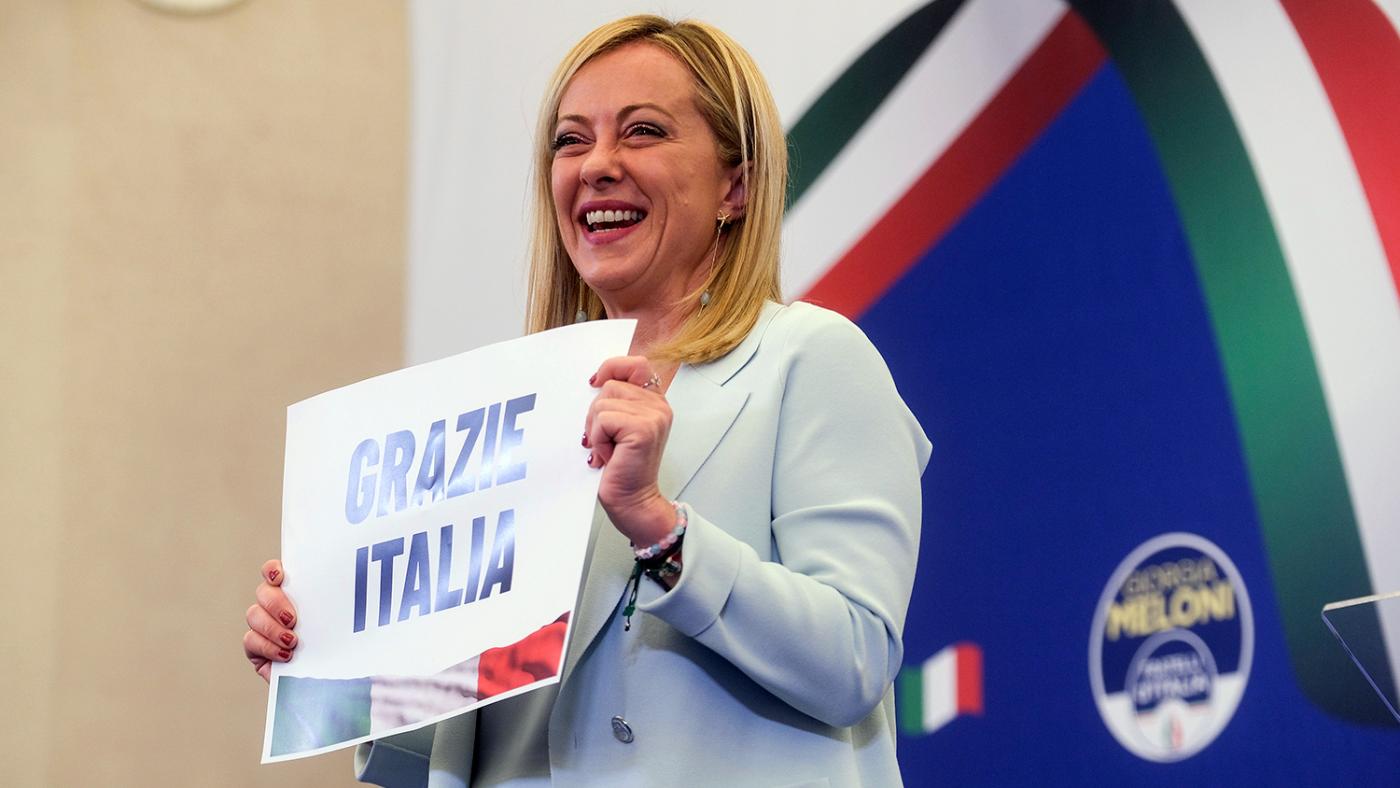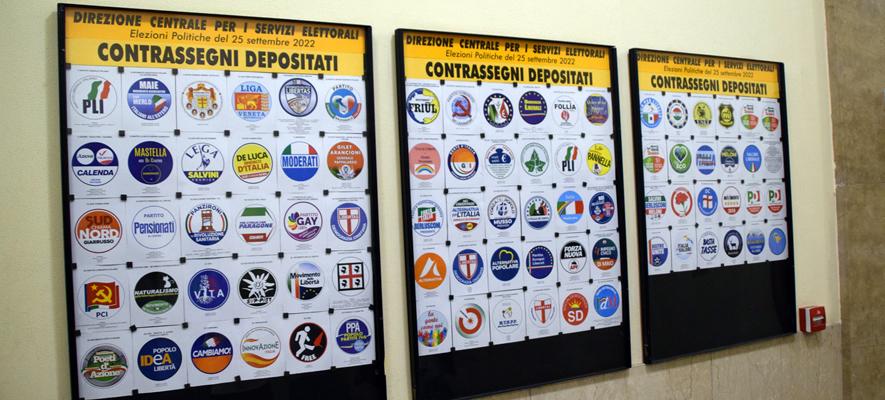Giorgia Meloni’s recent win
Italians at UU grapple with yet another far-right government

Italian media was flooded with election news, polls and predictions for a good half of the summer before the vote was cast on September 25. The majority of sources anticipated a high turnout for the far-right party Brothers of Italy, led by the member of parliament Giorgia Meloni. Her political party is a direct descendent of the Italian Social Movement, a neo-fascist organisation founded in 1946 by supporters of Mussolini, so much so that they share the same symbol. Giorgia Meloni herself joined its youth wing when she was just 15. The party and its leader both identify as Italian nationalists and conservative Catholic Christians who defend “God, fatherland, and family”. Her win saw the establishment of the country’s most far-right government since Fascism.
The turnout was the lowest ever registered: only 63 percent of Italians cast their vote at polling stations. 43 percent of them voted for the far-right coalition, comprised of Meloni’s Brothers of Italy, Salvini’s League, and Berlusconi’s Forza Italia. More than half of these votes went to Meloni’s party. The centre-left Democratic Party scraped together a staggeringly low 19 percent, the lowest result in its history, and admitted defeat.
Italy is a constitutional republic with a parliamentary system and has one head of government - the prime minister - and one head of state, the president of the Republic. The former leads both chambers of parliament, while the latter acts as the official head of state and represents national unity.
Less than a month after the elections, Auschwitz survivor Liliana Segre – acting as interim President of the Senate – had to announce Ignazio Benito La Russa as the official Senate leader. La Russa’s second name is no coincidence: his father was the secretary of his town’s Fascist party in the 40s and La Russa himself joined the neo-fascist party Italian Social Movement in his youth. He is now one of the highest authority figures in Italy’s parliamentary system. After Matteo Salvini’s win in the 2018 elections, Italians are used to a far-right government. This time, however, is more extreme than the others, making Italians abroad who disagree with the winning party feel even more disconnected from their country.

Participating parties on the election on September 25th (Photo Ministeri dell'Interno)
"No one really caters to young people"
Third-year Economics student Olimpia always thought that going abroad would bring more opportunities compared to staying in Italy. “Education-wise, there are just so many more options here in the Netherlands.” Job opportunities for young students and recent graduates in Italy are scarce, leading many students to move abroad, and the current political situation is not helping. “I don’t think I have ever felt represented by a political party, or at least not by one that had any chances of winning. No one really caters to young people like me”, Olimpia explains. Nevertheless, she went back to Italy to vote in the elections.
“I think Meloni won because people wanted a sort of fresh start and a new kind of authority. Her party formed the opposition during the previous government, and they were very vocal against the mistakes that that government made, so maybe people thought she could change things”, the student explains. “I definitely think the left is also to blame: their parties and campaigns have been collapsing for a while and Meloni was someone else to turn to after all the disappointment. If the left had an action plan and actually spoke to the people, I think things would change.”
When asked about her plans for the future, Olimpia reveals that they have not been especially influenced by the recent election results. “I already had plans to do my Master’s abroad, but I do want to permanently go back someday”, she says. “I am very privileged: even though I am a woman, I don’t fall under the groups that Meloni is targeting because I am financially secure. If they remove the right to abortion, for example, I can always travel to another European country to get one.” The right to free and secure access to abortion is strongly opposed by Brothers of Italy, which identifies as pro-life. “I am still scared of what this government might do, especially with Italy’s ties to other countries”, says the student. “I fear we might compromise our external relationships, for example in the Russia-Ukraine situation. Giorgia Meloni says she supports Ukraine, but she’s been a friend of Putin’s for a long time now.”
However, the political climate has not changed her relationship with her country: “I still miss people’s warmth and spontaneity. I feel immediately more relaxed whenever I go back to Italy. I guess that’s just our way of living. I really love it, and I hope the sadness we feel for the current situation can turn into a collective anger and show that not all of us are supporting this government.”
"It's really frustrating"
For Maria Laura, a second-year Sustainability student, coming to the Netherlands was all about her study programme: “I was looking for a Sustainability programme in English, and there is no such thing where I come from”, she says. “I left Italy and I really love being here in the Netherlands, but that doesn’t mean that I don’t care about my country anymore. I do feel that the latest elections reflect the ideals of an old Italy, a more conservative one”, she reflects. “When I read the programme of Meloni’s party, Brothers of Italy, I noticed that they were the only ones without a human rights or a civil rights section. That’s like 15 years behind most countries in the European Union.” She still feels that her vote is important, so she voted by mail from the Netherlands.
She is still unsure about her future plans: “Originally, I wanted to go back and work in Italy, because I really think the country needs young and educated minds, especially on topics like sustainability”, she explains, “but I don’t know if I will be able to handle it now. It’s really frustrating.” But the frustration doesn’t eliminate her hope for the future: “I don’t think Italy is a lost cause. I think we will get there eventually, it’s just a long time coming. I really hope to be part of this process of change, to bring back my knowledge and expertise and help the country change for the better, but I fear that it will not be too hard on me mentally. Whenever I go back, as soon as I queue at the airport gate and hear everyone speaking my language, I feel at home already. I don’t want to abandon my country. I really care about it, no matter how bittersweet our relationship may be.”

Photo protest Amnesty International in Italy: Human rights cannot be reversed
"I don’t think I will go back if things stay the same"
Another student, Agnese, who is in her third year of a sustainability Bachelor’s, decided to come to the Netherlands after spending a year as an au-pair in the United States. “I wanted a good English-taught programme, and there’s not many of those in Italy." She voted by mail in the recent elections, even though she has been unhappy and disappointed with the country’s government for quite some time. “It’s not even about the people in the government, but rather about the stability of it”, she says. “I honestly have trouble naming important politicians from the last 5 years because they were just constantly changing.” Since the Monarchy was abolished and the Republic instituted by popular vote in 1946, Italy’s governments have fallen a total of 66 times. A single mandate is supposed to last five years, but the average time a government has been in power is a little more than one year.
“Italy already had some right-wing governments, but none of the parties who were in power at the time were quite this extreme”, Agnese explains. “I think a combination of the left’s deteriorating political campaign, misinformation, and the right wing’s populistic rhetoric contributed to Meloni’s win. The way the elections were organised also made it more possible for people who are usually right-wing to vote: the polls were only opened for one day and it was not possible to vote outside your municipality of residence, so a lot of university students who were doing exams outside their regions were not able to vote, and they usually vote left.”
Her plans for the future are definitely being influenced by the new government. “I’m still not sure about where I want to go, but I don’t think I will go back if things stay the same”, she explains. “The current government has already proposed a new anti-abortion law, so Italy is not really the place I would like to be right now. If the situation does not improve, I will probably stay abroad. For myself and my own peace of mind.” However, she wishes she could go back permanently. “I do miss my family, being close to them and being able to see them whenever I want, without extensive planning and costly transportation. I also really think that more knowledge and awareness on topics like sustainability can help turn the situation around, and I would love to bring my expertise back. But not if it costs me my mental health.”